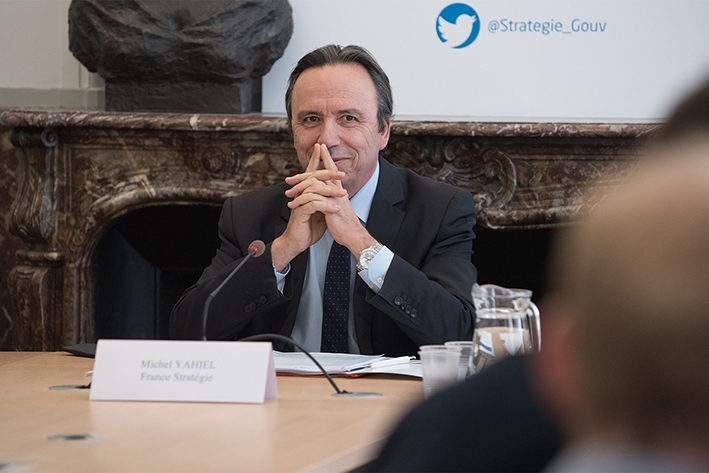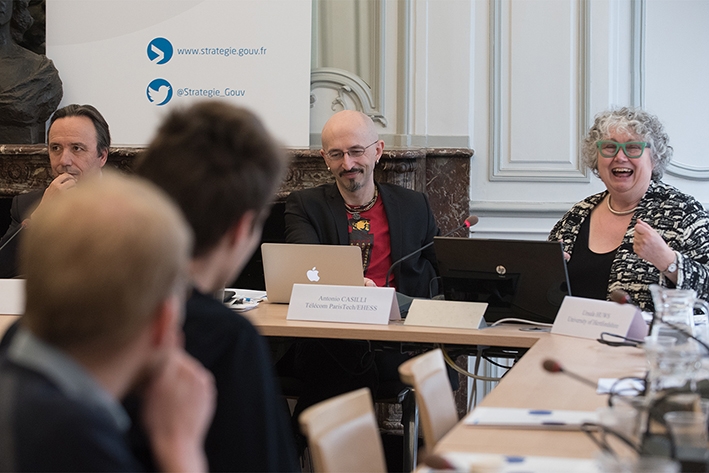But a closer look reveals that though the proliferation of new technology has rewritten a lot of the job market’s rules and created many new ways of earning a living, the traditional dichotomy of labour and capital remains very much unchanged. On the contrary, some would argue the rise of what has been termed the platform economy, dominated as it is by a handful of players like Amazon, eBay, Uber, Airbnb and Google, has only further skewed the balance of power in favour of capital.
France Stratégie invited Ursula Huws, professor of labour and globalisation at the UK’s University of Hertfordshire Business School, and Antonio Casilli, associate professor at Telecom ParisTech, to discuss the new online workforce and the consequences for the old system of benefits based on salaried work.
The upper hand
A convergence of different trends has given rise to the digital labour force, which Huws has labelled the “cybertariat”. First and foremost, Huws explained that as globalization has spread over the past three decades, multinational corporations have become more and more powerful and wealthy. The world’s biggest have revenue equivalent to the GDPs of countries like Portugal, Finland, Denmark – and even Sweden for the largest (Walmart, with income of half a trillion USD).
One of the key factors that has allowed these companies to amass such massive amounts of wealth is a global division of labour. Together with political forces that have become increasingly beholden to the interests represented by the large corporations, this has led to the decline of the 20th century economic model based on stable salaried employment.
Digital players have been able to benefit from this economic context and draw on the widespread use of computers and smartphones to grow rapidly. They have also encouraged and profited off of the commodification of culture and social interactions and, Huws stressed, the formalization of the informal economy (e.g. activities such as babysitting and gardening).
At the same time, the worst economic crisis in seven decades has only served to fragment the workforce even more and strengthen the business model of many platform companies, which is built on precarious work and non-standard contracts. Huws pointed out that many of their practices, such as using applications to notify workers of new tasks, customer ratings and online platforms for logging work done, have spread across the job market.
Behind the curtain
But while in advanced economies this new economic model usually conjures supplementing an income by driving for Uber, doing handiwork via Taskrabbit or renting out a home on Airbnb, Casilli pointed to a whole other workforce, much less visible, propping up the digital economy.
This human labour gives the lie to purely artificial intelligence, which it turns out is much more a mix of automation and “clickwork”, i.e. work carried out on online platforms. Workers living more often than not in Asia and Africa are paid piecemeal wages to train the algorithms that curate online content (e.g. tagging photos) for internet giants like Google and Facebook. They compete to perform this “gig” work and microtasks on platforms like Crowdflower, Amazon Mechanical Turk and Freelancer.com.
Another type of digital labour is also done mainly in developing countries. So-called clickfarms consist of workers paid low wages to click on websites or advertising links to either train search engine results or put a dent in a company’s competitor’s advertising. They are also paid to boost likes on Facebook or followers on Twitter. Needless to say, this work constitutes outright fraud.
As Casilli explained, those recruiting this labour tend to be in the Global North, whereas those carrying out the menial tasks are often in the Global South.
In the end, the flipside of the independence and autonomy the digital economy has afforded users appears to be labour that is more precarious, ‘taskified’ and even hidden. The question then is how can – and indeed when will – governments and policy makers intervene to counterbalance the spread of this cybertariat.










